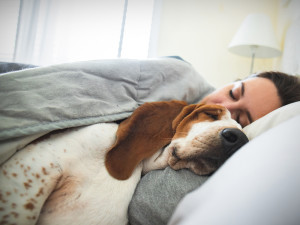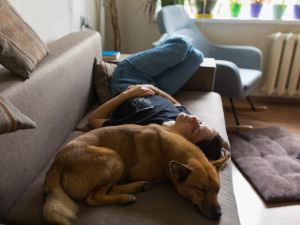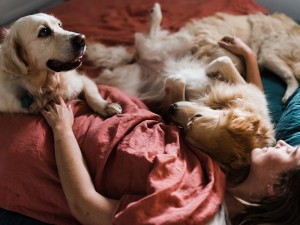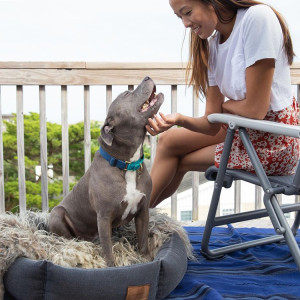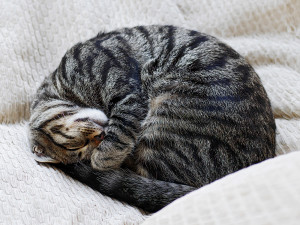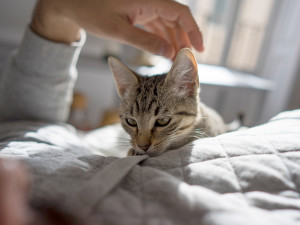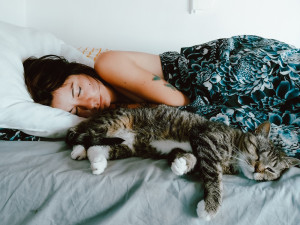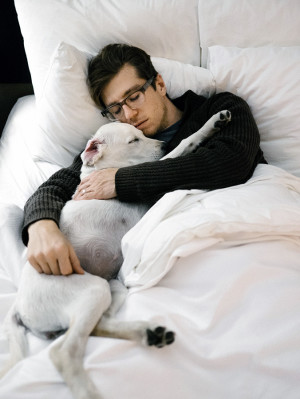Sleeping With Your Cat Is Good for You, Study Says—Your Dog? Not So Much
Co-sleeping with your pet has both positive and negative effects.

share article
Is there anything better than getting into bed and snuggling up with your pet, feeling their body pressed against yours as you lovingly rake your fingers through their fur? Even if they don’t sleep in the bed with you, just having them in the room can be such a comfort.
When my cat, Pumpkin, was alive, we slept together every night. He used to wait in the room while I washed my face and brushed my teeth. When I came in, he’d jump on the bed and start pacing and meowing, anxious for me to finally lie down. Once I was under the covers, he would plop himself in the crook of my left shoulder for up to an hour while I kissed and scratched him and the two of us watched TV on my tablet.
Sometimes, he’d fall asleep in my arms, which always felt extra magical. He’d stay a few more minutes after I turned out the lights, then relocate to the radiator cover near the foot of the bed. If I got up in the middle of the night to pee, he would check in for a 30-second cuddle when I returned. If I woke up from a nightmare and called for him, he would hurry over for a quick snuggle while I fell back asleep. With Pumpkin, bedtime was the best time, and I wouldn’t have traded it for anything. But was it actually good for my sleep?
Co-sleeping with cats is good for you. Sleeping with dogs isn’t.
It turns out sleeping with my cat, specifically, may have been good for me, at least according to research. A March studyopens in a new tab from Dr. Brian N. Chin, associate professor of psychology at Trinity College, found that people who sleep with cats actually get a better night's rest than those who sleep with dogs.
Dr. Chin and his co-authors, Tvisha Singh and Aisha S. Carothers, surveyed 1,591 people between the ages of 18 and 91. Of these, 758 reported co-sleeping with one or more pets, meaning their pet(s) either slept with them in the bed or in the same room. Participants in the study were asked to self-report on the quality of their sleep, their general stress levels, and their relationships with their pets. The answers of the 758 co-sleepers were then compared to the answers of the 833 non-co-sleepers to determine the impact of pets on sleep.
What Dr. Chin found was that people who reported co-sleeping with dogs had poorer perceived sleep quality (still feeling tired upon waking), poorer perceived sleep efficiency (the amount of time one is actually asleep during the time one has devoted to sleep), and greater insomnia severity (difficulty falling asleep, staying asleep, and getting quality sleep) than people who did not co-sleep with pets of any kind.
Cat co-sleepers in the study, on the other hand, reported no difference in sleep quality or insomnia severity compared to non-co-sleepers. And, in fact, they reported better sleep efficiency than dog-co-sleepers and non-co-sleepers alike.
Why is there a difference between cat and dog co-sleepers’ rest quality?
In other words, co-sleeping with cats appears to have a neutral or positive impact on sleep, whereas co-sleeping with dogs appears to have a more negative impact.
Dr. Chin suspects the negative effects of co-sleeping can be attributed to pets “serving as a source of nighttime disturbance” — moving around, making noise, and giving off too much body heat. While any pet can cause such disturbances, it makes sense that dogs, especially larger dogs, would be more disruptive than cats in this regard.
After all, cats are known for their ability to move quietly and gracefully through the dark. Dogs, on the other hand, not so much. And while a nine-pound cat moving on the bed might be slightly disturbing to a sleeping human, it’s nothing compared to the rocking and rolling of a 40-pound dog.
Dr. Chin also found that the more pets a co-sleeper had, the greater the impact on their sleep, especially when it came to insomnia severity. What Dr. Chin did not find is a link between how close someone is to their pet and their and how well they sleep. In other words, co-sleepers who reported being more bonded to their pets fared the same as those who reported being less bonded.
Regardless of the study findings, pet parents think co-sleeping benefits them.
Interestingly, 60 percent of the co-sleepers in the study said they believed that co-sleeping had a positive/very positive impact on their sleep, while only six percent believed the impact to be negative/very negative. What’s more, 83 percent said they believed co-sleeping had a positive/very positive impact on their overall health and wellbeing, as opposed to just two percent negative/very negative.
These assessments, of course, are somewhat opposite to the actual findings of the study. But this is hardly surprising given our human propensity for convincing ourselves that things that are demonstrably bad for us are somehow, in fact, not, simply because we enjoy them and/or do not want them to be.
Personally, I loved co-sleeping with Pumpkin during our time together and felt a physical pain in my body at the end of his life when he wouldn’t cuddle with me as much. When our nighttime ritual went from an hour of snuggles down to two minutes or less, I was devastated. My little man was pulling away, and it literally made my heart hurt. That said, when he finally died, I probably slept better than I had in a long time. Even if he wasn’t a big dog, waking me up every few minutes, the cuddling did mean some interrupted sleep.
Opting out of co-sleeping might end up being better for you, even if you have a cat.
Even though, according to the study, more cat parents reported good sleep, that doesn’t mean that’s true for every cat parent. After all, Pumpkin’s insistence on a quick cuddle every time I got up to go to the bathroom meant that I couldn’t just fall instantly back to sleep. I had to scratch him and kiss him and give him a little squeeze, and sometimes that was enough to wake me up to the point where I couldn’t get back to sleep for hours. Was it worth it? Absolutely. But I think a lot of pet parents, disturbed by co-sleeping or not, would probably say the same thing. Maybe our sleep could be better without them, but maybe it’s worth losing a little sleep to feel that closeness.
Of course, for some people that trade-off is not worth it, and that’s fine, too. A good night’s sleep is essential for proper functioning, and if your pet gets in the way of that too often, you can grow resentful, which is the last thing any pet parent wants.
If sleeping with your pet isn’t working for you, what do you do?
If you’ve already established a specific sleep routine with your dog, changing it can be tough, but it is doable, according to celebrity dog trainer Jessica Jacobson of Dapper Dog Trainingopens in a new tab.
“I recommend starting with your dog on a leash, while you sit on the couch with a bed for them at your feet,” Jacobson says. “Once they can fall asleep there, you move this setup to your bedroom, beginning the same way — sitting on the bed (not lying down) while they rest in their own bed on the floor beside you. When they fall asleep, you can unleash them and go to sleep yourself. After a few days, they should be able to fall asleep in their own bed without needing the leash at all, but the leash is important at the outset, because it ensures that you are not giving the dog any mixed signals about exactly where you want them to be.”
“If done properly, this transition should not cause your dog any stress,” Jacobson adds. “But if your dog is struggling — like if they are chewing on the leash or if you just feel like they are overwhelmed — seek help.”
If your goal is to get your dog to sleep in another room entirely, that can be even more difficult, but, again, it is doable. Once your dog is used to sleeping in their own bed, Jacobson suggests gradually moving it further and further away, until it is outside the room altogether. This might work. It might not. But it’s worth a try.
To make your dog more pliant at night, Jacobson suggests not allowing them to nap in the hours leading up to bedtime. “That way, when you are ready to sleep, they will be sleepy too,” Jacobson says. “And if you can get them to fall asleep in their own bed, and they are tired enough, you should then be able to move that bed into another room.”
Cats might have a harder time learning not to co-sleep.
Changing your cat’s sleep routine can also be tough, but Dr. Marci Koskiopens in a new tab of Feline Behavior Solutionsopens in a new tab offers some hope. “You can’t just close the door, because cat’s hate closed doors. You have to give them an option that is as attractive as sleeping in the bedroom with you,” Dr. Koski says. “One of the reasons cats like to snuggle is for the heat, so give them a heated cat mat or bed and put it somewhere else they already like to sleep. Then, they will be drawn to that spot whether it is night or day.”
Koski also suggests establishing a more ritualized nighttime routine that plays into your cat’s natural hunt-eat-groom-sleep cycle. “Giving them a really good play session and a little food before you go to bed can encourage them to settle down when you need them to,” Koski adds.
Of course, cats are notoriously difficult to train, so if you really need your cat to stay out of your room at night and you can't manage to compel them on your own, don’t be afraid to ask for help.
The fact is, co-sleeping can be wonderful for bonding, but, as Dr. Chin’s study shows, it can also negatively impact your sleep. If that starts negatively impacting your relationship with your pet, then it will be far better for both of you if you take steps to move your pet into another room, even if it is difficult at first. Of course, if you would rather snuggle with your dog or cat than get the best possible night’s sleep, that’s fine too. You do you. Just know that you have options (even if your cat tells you otherwise — your dog probably understands.)

Charles Manning
Charles Manning is an actor, writer, and fashion/media consultant living in New York City with his two cats, Pumpkin and Bear. Follow him on Instagram @charlesemanningopens in a new tab.
Related articles
![Shiba inu dog sleeping in bed]() opens in a new tab
opens in a new tabMy Dog Sleeps All Day—Is That Normal?
Dogs need more sleep than humans. Here’s how much is healthy.
![a human petting a dog on a dog bed]() opens in a new tab
opens in a new tab16 Best Dog Beds Recommended By Experts
Our dogs sleep with us, too. But these trainer-recommended dog beds — from indestructible ones for puppies to orthopedic options for seniors — are the next best thing.
![Curled up tabby cat sleeping on pillows]() opens in a new tab
opens in a new tabWhy Do Cats Sleep So Much?
A very sleepy kitty isn’t usually a problem, but watch out for these signs of medical distress.
![kitten sleeping on top of person]() opens in a new tab
opens in a new tabWhy Does My Cat Sleep on Me?
Not into cuddling? Too bad — they’re spending the night.
![woman with dark hair lying in bed with striped cat, both asleep]() opens in a new tab
opens in a new tabShould I Let My Cat Sleep With Me? Things to Consider About Having Your Cat in Bed
Here are the pros and cons of having a feline sleeping buddy.
![Man in his mid 20's cuddling in bed with his white labrador puppy.]() opens in a new tab
opens in a new tabWhy Napping With Your Pet Is Actually Good for You
This study says you benefit from a power nap. Guess what? So does your cat or dog.
